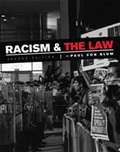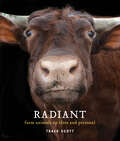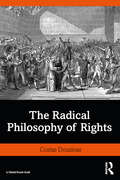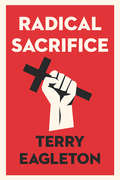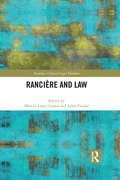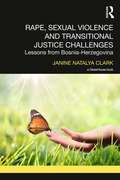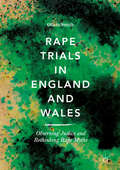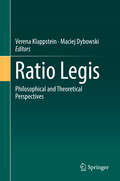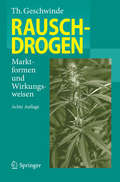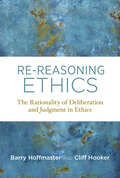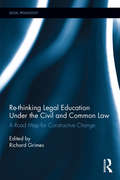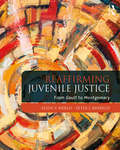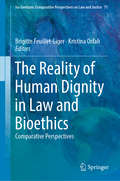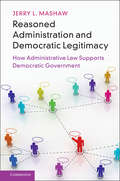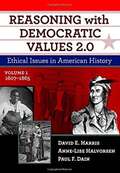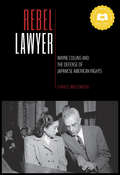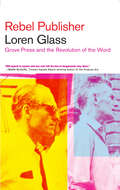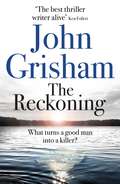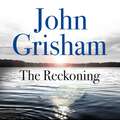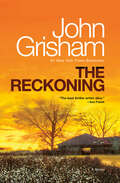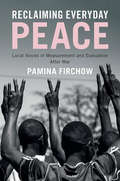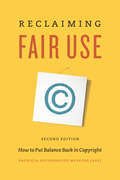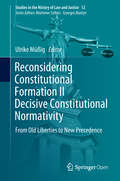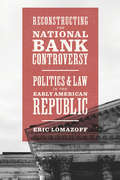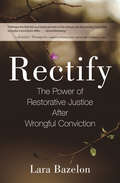- Table View
- List View
Racism and The Law
by Paul Von BlumRacism and the Law is a text and casebook that provides an introduction to the close and complex relationships between race and law, legal institutions, and legal personnel. It combines original text with primary source documents such as judicial decisions and statutory materials. Historical, political, and linguistic analyses of legal materials are provided throughout the text. The book deals with the major historical legal developments that have caused and reinforced discrimination against African Americans, Asians, and Latinos, and addresses the courageous efforts of civil rights lawyers and organizations working for racial justice and equality in America. The volume is intended for use in undergraduate studies in several fields, including political science, history, African American studies, public policy, sociology, and criminal justice. It includes a bibliography for readers who wish to explore the topics in greater depth and the concluding chapter features specific directions for prospective lawyers who hope to work for racial justice in the early 21st century.
Radiant: Farm Animals Up Close and Personal
by Traer ScottGregarious or shy, curious or placid, playful or retiring, all the animals in Traer Scott's newest collection have one thing in common: a sparkling personality! This whimsical, soulful, and personal photo collection focuses on the lives of the farm animals we often take for granted. Scott introduces us to barnyard animals both familiar and lesser known, from cows, pigs, sheep, and chickens to Dolly the wooly llama, Bianca the Sicilian miniature donkey, Percy the Indian peafowl, and Justice the yak. Some of the animals are kept as pets; others are denizens of farm sanctuaries that Scott has visited. She shares her anecdotes about a Texas longhorn steer whose best friends are a trio of goats, a turkey who likes to snack on grapes and watermelon, and many others. Lively captions provide information on each breed, to round out this enchanting tribute to our four-legged (and winged) friends from the farm.
The Radical Philosophy of Rights
by Costas DouzinasAfter 1989 human rights have expanded into a vernacular touching every aspect of social life. They are seen as the key concept in morals and politics and a main tool for forging individual and collective identities. They are the ideology after ‘the end of ideologies’ – the only values left after ‘the end of history’. The response of the left to the rights revolution has been muted and unsure. Classical Marxist critiques of (natural) rights have made the left justly suspicious, and this is still the case today. Elaborating and addressing a series of foundational paradoxes of rights, this book – the third in Costas Douzinas’s human rights trilogy, following The End of Human Rights and Human Rights and Empire – provides a long-overdue re-evaluation of the history and political uses of rights for the left. The book examines the history and philosophy of the (legal) person, the subject, the human and dignity from classical Rome to postmodern Brussels. It traces the gradual abandonment of right, virtue and the common good for individual rights and self-interest. The limited and distorted conception of rights of liberal jurisprudence is contrasted with an alternative that sees rights as a relation involved in the struggle for recognition and an everyday utopia. The right to resistance and revolution, prohibited but regularly returning like the repressed, rescues law from sclerosis and presents a case study of the paradoxical nature of rights. Finally, the book offers a brief examination of law’s encounter with radical politics informed by the author’s strange experience as an ‘accidental’ politician in the first radical left government in Europe. The book’s radical concept of legal philosophy and public law will be of considerable value to legal theorists, political philosophers and anyone with an interest in thinking and acting in ways that go beyond the limits of liberal, and neoliberal, ideology.
Radical Sacrifice
by Terry EagletonA trenchant analysis of sacrifice as the foundation of the modern, as well as the ancient, social order The modern conception of sacrifice is at once cast as a victory of self-discipline over desire and condescended to as destructive and archaic abnegation. But even in the Old Testament, the dual natures of sacrifice, embodying both ritual slaughter and moral rectitude, were at odds. In this analysis, Terry Eagleton makes a compelling argument that the idea of sacrifice has long been misunderstood. Pursuing the complex lineage of sacrifice in a lyrical discourse, Eagleton focuses on the Old and New Testaments, offering a virtuosic analysis of the crucifixion, while drawing together a host of philosophers, theologians, and texts—from Hegel, Nietzsche, and Derrida to the Aeneid and The Wings of the Dove. Brilliant meditations on death and eros, Shakespeare and St. Paul, irony and hybridity explore the meaning of sacrifice in modernity, casting off misperceptions of barbarity to reconnect the radical idea to politics and revolution.
Ranciere and Law (Nomikoi: Critical Legal Thinkers)
by Monica Lopez Lerma Julen EtxabeThis book is the first to approach Jacques Rancière’s work from a legal perspective. A former student of Louis Althusser, Rancière is one of the most important contemporary French philosophers of recent decades: offering an original and path-breaking way to think politics, democracy and aesthetics. Rancière’s work has received wide and increasing critical attention, but no study exists so far that reflects on the wider implications of Rancière for law and for socio-legal studies. Although Rancière does not pay much specific attention to law—and there is a strong temptation to identify law with what he terms the "police order"—much of Rancière’s historical work highlights the creative potential of law and legal language, with important legal implications and ramifications. So, rather than excavate the Rancièrean corpus for isolated statements about the law, this volume reverses such a method and asks: what would a Rancière-inspired legal theory look like? Bringing together specialists and scholars in different areas of law, critical theory and philosophy, this rethinking of law and socio-legal studies through Rancière provides an original and important engagement with a range of contemporary legal topics, including constituent power and democracy, legal subjectivity, human rights, practices of adjudication, refugees, the nomos of modernity, and the sensory configurations of law. It will, then, be of considerable interest to those working in these areas.
Rape, Sexual Violence and Transitional Justice Challenges: Lessons from Bosnia Herzegovina
by Janine Natalya ClarkIt is estimated that 20,000 people were subjected to rape and other forms of sexual violence during the 1992–1995 Bosnian war. Today, these men and women have been largely forgotten. Where are they now? To what extent do their experiences continue to affect and influence their lives, and the lives of those around them? What are the principal problems that these individuals face? Such questions remain largely unanswered. More broadly, the long-term consequences of conflict-related rape and sexual violence are often overlooked. Based on extensive interviews with male and female survivors from all ethnic groups in Bosnia-Herzegovina (BiH), this interdisciplinary book addresses a critical gap in the current literature on rape and sexual violence in conflict situations. In so doing, it uniquely situates and explores the legacy of these crimes within a transitional justice framework. Demonstrating that transitional justice processes in BiH have neglected the long-term effects of rape and sexual violence, it develops and operationalizes a new holistic approach to transitional justice that is based on an expanded conception of ‘legacy’ and has a wider application beyond BiH.
Rape Trials in England and Wales: Observing Justice And Rethinking Rape Myths
by Olivia SmithIn light of ongoing concerns about the treatment of survivors, Rape Trials in England and Wales critically examines court responses to rape and sexual assault. Using new data from an in-depth observational study of rape trials, this book asks why attempts to improve survivor experiences at court have not been fully effective. In doing so, Smith identifies deep-rooted barriers to survivor justice and, crucially, introduces potential avenues for more effective reform. This book provides a comprehensive examination of the practicalities of court, use of rape myths and sexual history evidence, underlying principles of adversarial justice and the impact of inequalities embedded within English and Welsh legal culture. This engaging and highly significant study is essential reading for anyone seeking to understand the criminal courts and their responses to rape, including practitioners and students of criminology, sociology, and law.
Ratio Legis: Philosophical And Theoretical Perspectives
by Verena Klappstein Maciej DybowskiThe book is dedicated to the theoretical problems concerning ratio legis. In the contexts of legal interpretation and legal reasoning, the two most important intellectual tools employed by lawyers, ratio legis would seem to offer an extremely powerful argument. Declaring the ratio legis of a statute can lead to a u-turn argumentation throughout the lifespan of the statute itself – in parliament, or in practice during court sessions, when it is tested against the constitution.Though the ratio legis argument is widely used, much about it warrants further investigation. On the general philosophical map there are many overlapping areas that concern different approaches to human rationality and to the problems of practical reasoning. Particular problems with ratio legis arise in connection with different perspectives on legal philosophy and theory, especially in terms of the methods that lawyers use for legal interpretation and argumentation. These problems can be further subdivided into particular aspects of activities undertaken by lawyers and officials who use the ratio legis in their work, and the underlying theories. In short, this book examines what ratio legis is, what it could be, and its practical implications.
Rauschdrogen: Marktformen Und Wirkungsweisen
by Thomas GeschwindeDas Werk bietet grundlegende Informationen zu den Wirkungsweisen verschiedener Drogen. Die ausführliche Darstellung in Form eines Nachschlagewerks ermöglicht den Vergleich der jeweiligen Wirkungen. Neben „klassischen“ Drogen wie Kokain werden in der Neuauflage auch vollsynthetische, ursprünglich für medizinische Therapien entwickelte Substanzen ausführlich behandelt. Ferner werden pflanzliche Stoffe, die über Online-Shops erhältlich sind, und „Lifestyle-Medikamente“, die u. a. zur kognitiven Leistungssteigerung eingenommen werden, berücksichtigt.
Re-Reasoning Ethics: The Rationality of Deliberation and Judgment in Ethics (Basic Bioethics)
by Barry Hoffmaster Cliff HookerHow developing a more expansive, non-formal conception of reason produces richer ethical understandings of human situations, explored and illustrated with many real examples.In Re-Reasoning Ethics, Barry Hoffmaster and Cliff Hooker enhance and empower ethics by adopting a non-formal paradigm of rational deliberation as intelligent problem-solving and a complementary non-formal paradigm of ethical deliberation as problem-solving design to promote human flourishing. The non-formal conception of reason produces broader and richer ethical understandings of human situations, not the simple, constrained depictions provided by moral theories and their logical applications in medical ethics and bioethics. Instead, it delivers and vindicates the moral judgment that complex, contextual, and dynamic situations require.Hoffmaster and Hooker demonstrate how this more expansive rationality operates with examples, first in science and then in ethics. Non-formal reason brings rationality not just to the empirical world of science but also to the empirical realities of human lives. Among the many real cases they present is that of how women at risk of having children with genetic conditions decide whether to try to become pregnant. These women do not apply the formal principle of maximizing expected utility (as advised by genetic counselors) and instead imagine scenarios of what their lives could be like with an affected child and assess whether they could accept the worst of these scenarios.Hoffmaster and Hooker explain how moral compromise and a liberated, extended, and enriched reflective equilibrium expand and augment rational ethical deliberation and how that deliberation can rationally design ethical practices, institutions, and policies.
Re-thinking Legal Education under the Civil and Common Law: A Road Map for Constructive Change (Legal Pedagogy)
by Richard GrimesWhilst educational theory has developed significantly in recent years, much of the law curriculum remains content-driven and delivered traditionally, predominantly through lecture format. Students are, in the main, treated as empty vessels to be filled by the eminent academics of the day. Re-thinking Legal Education under the Common and Civil Law draws on the experience of teachers, practitioners and students across the world who are committed to developing a more effective learning process. Little attention has, historically, been paid to the importance of the application of theory, the role of reflective learning, the understanding and acquisition of lawyering skills and the development of professional responsibility and wider ethical values. With contributions from across the global north and south, this book examines the history of educating our lawyers, the influences and constraints that may shape the curriculum, the means of delivering it and the models that could be used to tackle current shortcomings. The whole is intended to represent what might be desirable and possible if we are to produce lawyers that are fit for purpose in the 21st century, be that in either in civil or common law jurisdictions. This book will be of direct assistance to those who wish to understand the theory and practice of legal pedagogy in an experiential context. It will be essential reading for academics, researchers and teachers in the fields of law and education, particularly those concerned with curriculum design and developing interactive teaching methods. It is likely to be of interest to law students too – particularly those who value a more direct engagement in their learning.
Reaffirming Juvenile Justice: From Gault to Montgomery
by Alida V. Merlo Peter J. BenekosThis book will expand students’ knowledge and understanding of the evolution of juvenile justice in the last 50 years. Designed to coincide with the 50th anniversary of the landmark case In re Gault, which the U.S. Supreme Court decided in 1967, the authors provide a brief history of juvenile justice, then frame the developments and transformations that have occurred in the intervening years. Topics covered include an overview of the dramatic changes to the field following the spike in youth violence in the 1990s, the "superpredator" myth, zero-tolerance policies, and sanctions for juvenile offenders—particularly the 2005 abolition of the death penalty and subsequent decision on life without parole. The book also covers child and youth victimization and trauma, and recent prevention and treatment initiatives. Designed for upper-level undergraduates, this text reflects on the evolving U.S. juvenile justice system while anticipating future challenges and trends. Reaffirming Juvenile Justice illustrates how ideology, media, and politics shape policy and how it can evolve.
The Reality of Human Dignity in Law and Bioethics: Comparative Perspectives (Ius Gentium: Comparative Perspectives on Law and Justice #71)
by Brigitte Feuillet-Liger Kristina OrfaliAdopting an interdisciplinary perspective, this volume explores the reality of the principle of human dignity – a core value which is increasingly invoked in our societies and legal systems. This book provides a systematic overview of the legal and philosophical concept in sixteen countries representing different cultural and religious contexts and examines in particular its use in a developing case law (including of the European Court of Human Rights and of the Inter-American Court of Human Rights). Whilst omnipresent in the context of bioethics, this book reveals its wider use in healthcare more generally, treatment of prisoners, education, employment, and matters of life and death in many countries. In this unique comparative work, contributing authors share a multidisciplinary analysis of the use (and potential misuse) of the principle of dignity in Europe, Africa, South and North America and Asia. By revealing the ambivalence of human dignity in a wide range of cultures and contexts and through the evolving reality of case law, this book is a valuable resource for students, scholars and professionals working in bioethics, medicine, social sciences and law. Ultimately, it will make all those who invoke the principle of human dignity more aware of its multi-layered character and force us all to reflect on its ability to further social justice within our societies.
Reasoned Administration and Democratic Legitimacy: How Administrative Law Supports Democratic Government
by Jerry L. MashawReasoned Administration and Democratic Legitimacy: How Administrative Law Supports Democratic Government explores the fundamental bases for the legitimacy of the modern administrative state. While some have argued that modern administrative states are a threat to liberty and at war with democratic governance, Jerry L. Mashaw demonstrates that in fact reasoned administration is more respectful of rights and equal citizenship and truer to democratic values than lawmaking by either courts or legislatures. His account features the law's demand for reason giving and reasonableness as the crucial criterion for the legality of administrative action. In an argument combining history, sociology, political theory and law, this book demonstrates how administrative law's demand for reasoned administration structures administrative decision-making, empowers actors within and outside the government, and supports a complex vision of democratic self-rule.
Reasoning With Democratic Values 2. 0: Ethical Issues In American History, Volume 1: 1607-1865
by David E. Harris Anne-Lise Halvorsen Paul F. DainNow thoroughly updated and extensively revised for use in today’s history classrooms, this time-honored classic has never been more important than right now. <p><p>The new edition, Reasoning with Democratic Values2.0, presents an engaging approach to teaching U.S. history that promotes critical thinking and social responsibility. <p><p>In Volume 1 students investigate 20 significant historical episodes, arranged chronologically, beginning with the colonial era and ending with Reconstruction. Each carefully researched story examines an ethical decision made by an individual or group from the American past, and is guaranteed to excite students’ imaginations and spark lively classroom discussions involving core values of American democracy—liberty, equality, life, property, truth, and diversity. <p><p>The discussions aim to develop more mature moral reasoning by students while deepening their knowledge of American history. Each chapter contains five types of learning activities: Facts of the Case, Historical Understanding, Expressing Your Reasoning, Key Concepts from History, and Historical Inquiry. <p><p> In Volume 1, students can grapple with such ethical dilemmas as: <p> Should the Commonwealth of Massachusetts have granted reparation to the enslaved woman, Belinda Royall? <p>Should Thomas Jefferson have freed his slaves? <p>Should Juan Seguín have fought against the United States in the Mexican–American War? <p>Should Robert E. Lee have accepted command of the Union Army? <p><p>You can also purchase a comprehensive Instructor’s Manual that includes the rationale for the teaching approach, guidance for selecting chapters, direction for leading classroom discussions of ethical issues, suggestions for assessment and grading, answers for the learning activities, and more! <p><p> PROFESSIONAL DEVELOPMENT: The authors are available, at no fee, to conduct professional development programs for teachers and/or administrators regarding teaching with RDV 2.0. Visit www.rdv2.org for more details, including author contact information. The authors have committed their royalties to teacher education.
Rebel Lawyer: Wayne Collins and the Defense of Japanese American Rights
by Charles WollenbergWinner of the 2017 California Historical Society Book Award! Fred Korematsu, Iva Toguri (alias Tokyo Rose), Japanese Peruvians, and five thousand Americans who renounced their citizenship under duress: Rebel Lawyer tells the story of the key cases pertaining to the World War II incarceration of 120,000 people of Japanese ancestry and the trial attorney who defended them. Wayne Collins made a somewhat unlikely hero. An Irish American lawyer with a volatile temper, Collins’s passionate commitment to the nation’s constitutional principles put him in opposition to not only the United States government but also groups that acquiesced to internment such as the national office of the ACLU and the leadership of the Japanese American Citizens League. Through careful research and legal analysis, Charles Wollenberg takes readers through each case, and offers readers an understanding of how Collins came to be the most effective defender of the rights and liberties of the West Coast’s Japanese and Japanese American population. Wollenberg portrays Collins not as a white knight but as a tough, sometimes difficult man whose battles gave people of Japanese descent the foundation on which to construct their own powerful campaigns for redress.
Rebel Publisher: Grove Press and the Revolution of the Word
by Loren GlassHow Grove Press ended censorship of the printed word in America.Grove Press and its house journal, The Evergreen Review, revolutionized the publishing industry and radicalized the reading habits of the "paperback generation." In telling this story, Rebel Publisher offers a new window onto the long 1960s, from 1951, when Barney Rosset purchased the fledgling press for $3,000, to 1970, when the multimedia corporation into which he had built the company was crippled by a strike and feminist takeover. Grove Press was not only one of the entities responsible for ending censorship of the printed word in the United States but also for bringing avant-garde literature, especially drama, into the cultural mainstream. Much of this happened thanks to Rosset, whose charismatic leadership was crucial to Grove's success. With chapters covering world literature and the Latin American boom; experimental drama such as the Theater of the Absurd, the Living Theater, and the political epics of Bertolt Brecht; pornography and obscenity, including the landmark publication of the complete work of the Marquis de Sade; revolutionary writing, featuring Rosset's daring pursuit of the Bolivian journals of Che Guevara; and underground film, including the innovative development of the pocket filmscript, Loren Glass covers the full spectrum of Grove's remarkable achievement as a communications center for the counterculture.
The Reckoning: The Sunday Times Number One Bestseller
by John Grisham'I couldn't help thinking of Harper Lee's great American novel To Kill a Mockingbird while reading The Reckoning . . . [Grisham] knows how to spin a yarn' - Chicago Sun-Times'May be his greatest work yet' - David Grann, New York Times bestselling author of Killers of the Flower Moon?Pete Banning was Clanton's favourite son, a returning war hero, the patriarch of a prominent family; a farmer, father, and a faithful member of the Methodist Church. Then one cool October morning in 1946, he rose early, drove into town, walked into the Church, and calmly shot and killed the Reverend Dexter Bell.As if the murder wasn't shocking enough, it was even more baffling that Pete's only statement about it - to the sheriff, to his defense attorney, to the judge, to his family and friends, and to the people of Clanton - was 'I have nothing to say'.What turned Pete from a pillar of the community into cold-hearted killer? And why won't he confide in anyone? All his closest family knows is that it must have been something devastating - and that the fallout will haunt them, and the town, for decades to come . . .Further praise for The Reckoning'Beautifully constructed . . . weaves a truly magical spell' - Daily Mail'In this saga of love and war, John Grisham has given us a sprawling and engrossing story about a southern family, a global conflict, and the kinds of secrets that can shape all of us. From the courtrooms and jails of rural Mississippi to the war-torn Pacific, Grisham spins a tale that is at once entertaining and illuminating' - Jon Meacham, New York Times bestselling author of The Soul of America'John Grisham is the master of legal fiction, and his latest starts with a literal bang - and then travels backward through the horrors of war to explore what makes a hero, what makes a villain, and how thin the line between the two might be' - Jodi Picoult, internationally bestselling author of A Spark of Light and Small Great Things'When a master of storytelling and suspense takes on one of the most wrenching stories in history, the result is a book that will break your heart, set your blood pumping and your mind racing, and leave you gasping for breath by the final page. I'm still trying to recover from The Reckoning' - Candice Millard, New York Times bestselling author of The River of Doubt and Destiny of the Republic 350+ million copies, 45 languages, 9 blockbuster films:NO ONE WRITES DRAMA LIKE JOHN GRISHAM
The Reckoning: The Sunday Times Number One Bestseller
by John GrishamThe electrifying new thriller from internationally bestselling author John Grisham.John Grisham returns to Clanton, Mississippi, to tell the story of an unthinkable murder, the bizarre trial that followed it, and its profound and lasting effect on the people of Ford County.Pete Banning was Clanton's favourite son, a returning war hero, the patriarch of a prominent family, a farmer, father, neighbour, and a faithful member of the Methodist Church. Then one cool October morning in 1946. he rose early, drove into town, walked into the church, and calmly shot and killed the Reverend Dexter Bell.As if the murder wasn't shocking enough, it was even more baffling that Pete's only statement about it - to the sheriff, to his defense attorney, to the judge, to his family and friends, and to the people of Clanton - was 'I have nothing to say'.And so the murder of the esteemed Reverend Bell became the most mysterious and unforgettable crime Ford County had ever known.Praise for Grisham's latest book, The Rooster Bar'Scintillating storytelling' - The Sunday Times'A buoyant, mischievous thriller . . . This reliable best-selling author is feeling real pleasure, and not just obligation, in delivering his work' - New York Times(P)2018 Random House Audio
The Reckoning: A Novel
by John Grisham#1 NEW YORK TIMES BESTSELLER • John Grisham's most powerful, surprising, and suspenseful thriller yet • &“A murder mystery, a courtroom drama, a family saga.&” —USA TodayOctober 1946, Clanton, Mississippi Pete Banning was Clanton, Mississippi&’s favorite son—a decorated World War II hero, the patriarch of a prominent family, a farmer, father, neighbor, and a faithful member of the Methodist church. Then one cool October morning he rose early, drove into town, and committed a shocking crime. Pete's only statement about it—to the sheriff, to his lawyers, to the judge, to the jury, and to his family—was: "I have nothing to say." He was not afraid of death and was willing to take his motive to the grave. In a major novel unlike anything he has written before, John Grisham takes us on an incredible journey, from the Jim Crow South to the jungles of the Philippines during World War II; from an insane asylum filled with secrets to the Clanton courtroom where Pete&’s defense attorney tries desperately to save him. Reminiscent of the finest tradition of Southern Gothic storytelling, The Reckoning would not be complete without Grisham&’s signature layers of legal suspense, and he delivers on every page.Don&’t miss John Grisham&’s new book, THE EXCHANGE: AFTER THE FIRM!
Reclaiming Everyday Peace: Local Voices in Measurement and Evaluation After War
by Pamina FirchowBringing armed conflicts to an end is difficult; restoring a lasting peace can be considerably harder. Reclaiming Everyday Peace addresses the effectiveness and impact of local level interventions on communities affected by war. Using an innovative methodology to generate participatory numbers, Pamina Firchow finds that communities saturated with external interventions after war do not have substantive higher levels of peacefulness according to community-defined indicators of peace than those with lower levels of interventions. These findings suggest that current international peacebuilding efforts are not very effective at achieving peace by local standards because disproportionate attention is paid to reconstruction, governance and development assistance with little attention paid to community ties and healing. Firchow argues that a more bottom up approach to measuring the effectiveness of peacebuilding is required. By finding ways to effectively communicate local community needs and priorities to the international community, efforts to create an atmosphere for an enduring peace are possible.
Reclaiming Fair Use: How to Put Balance Back in Copyright, Second Edition
by Patricia Aufderheide Peter JasziIn the increasingly complex and combative arena of copyright in the digital age, record companies sue college students over peer-to-peer music sharing, YouTube removes home movies because of a song playing in the background, and filmmakers are denied a distribution deal when a permissions i proves undottable. Analyzing the dampening effect that copyright law can have on scholarship and creativity, Patricia Aufderheide and Peter Jaszi urge us to embrace in response a principle embedded in copyright law itself—fair use. Originally published in 2011, Reclaiming Fair Use challenged the widely held notion that copyright law is obsolete in an age of digital technologies. Beginning with a survey of the contemporary landscape of copyright law, Aufderheide and Jaszi drew on their years of experience advising documentary filmmakers, English teachers, performing arts scholars, and other creative professionals to lay out in detail how the principles of fair-use can be employed to avoid copyright violation. Taking stock of the vibrant remix culture that has only burgeoned since the book’s original publication, this new edition addresses the expanded reach of fair use—tracking the Twitter hashtag #WTFU (where’s the fair use?), the maturing of the transformativeness measure in legal disputes, the ongoing fight against automatic detection software, and the progress and delays of digitization initiatives around the country. Full of no-nonsense advice and practical examples, Reclaiming Fair Use remains essential reading for anyone interested in law, creativity, and the ever-broadening realm of new media.
Reconsidering Constitutional Formation II Decisive Constitutional Normativity: From Old Liberties to New Precedence (Studies in the History of Law and Justice #12)
by Ulrike MüßigThis second volume of ReConFort, published open access, addresses the decisive role of constitutional normativity, and focuses on discourses concerning the legal role of constitutional norms. Taken together with ReConFort I (National Sovereignty), it calls for an innovative reassessment of constitutional history drawing on key categories to convey the legal nature of the constitution itself (national sovereignty, precedence, justiciability of power, judiciary as constituted power).In the late 18th and early 19th centuries, constitutional normativity began to complete the legal fixation of the entire political order. This juridification in one constitutional text resulted in a conceptual differentiation from ordinary law, which extends to alterability and justiciability. The early expressions of this ‘new order of the ages’ suggest an unprecedented and irremediable break with European legal tradition, be it with British colonial governance or the French ancien régime. In fact, while the shift to constitutions as a hierarchically ‘higher’ form of positive law was a revolutionary change, it also drew upon old liberties. The American constitutional discourse, which was itself heavily influenced by British common law, in turn served as an inspiration for a variety of constitutional experiments – from the French Revolution to Napoleon’s downfall, in the halls of the Frankfurt Assembly, on the road to a unified Italy, and in the later theoretical discourse of twentieth-century Austria. If the constitution states the legal rules for the law-making process, then its Kelsian primacy is mandatory.Also included in this volume are the French originals and English translations of two vital documents. The first – Emmanuel Joseph Sieyès’ Du Jury Constitutionnaire (1795) – highlights an early attempt to reconcile the democratic values of the French Revolution with the pragmatic need to legally protect the Revolution. The second – the 1812 draft of the Constitution of the Kingdom of Poland – presents the ‘constitutional propaganda’ of the Russian Tsar Alexander I to bargain for the support of the Lithuanian and Polish nobility. These documents open new avenues of research into Europe’s constitutional history: one replete with diverse contexts and national experiences, but above all an overarching motif of constitutional decisiveness that served to complete the juridification of sovereignty. (www.reconfort.eu)
Reconstructing the National Bank Controversy: Politics and Law in the Early American Republic
by Eric LomazoffThe Bank of the United States sparked several rounds of intense debate over the meaning of the Constitution’s Necessary and Proper Clause, which authorizes the federal government to make laws that are “necessary” for exercising its other powers. Our standard account of the national bank controversy, however, is incomplete. The controversy was much more dynamic than a two-sided debate over a single constitutional provision and was shaped as much by politics as by law. With Reconstructing the National Bank Controversy, Eric Lomazoff offers a far more robust account of the constitutional politics of national banking between 1791 and 1832. During that time, three forces—changes within the Bank itself, growing tension over federal power within the Republican coalition, and the endurance of monetary turmoil beyond the War of 1812 —drove the development of our first major debate over the scope of federal power at least as much as the formal dimensions of the Constitution or the absence of a shared legal definition for the word “necessary.” These three forces—sometimes alone, sometimes in combination—repeatedly reshaped the terms on which the Bank’s constitutionality was contested. Lomazoff documents how these three dimensions of the polity changed over time and traces the manner in which they periodically led federal officials to adjust their claims about the Bank’s constitutionality. This includes the emergence of the Coinage Clause—which gives Congress power to “coin money, regulate the value thereof”—as a novel justification for the institution. He concludes the book by explaining why a more robust account of the national bank controversy can help us understand the constitutional basis for modern American monetary politics.
Rectify: The Power of Restorative Justice After Wrongful Conviction
by Lara BazelonMakes a powerful argument for adopting a model of restorative justice as part of the Innocence Movement so exonerees, crime victims, and their communities can come together to heal.In Rectify, a former Innocence Project director and journalist Lara Bazelon puts a face to the growing number of men and women exonerated from crimes that kept them behind bars for years - sometimes decades - and that devastate not only the exonerees but also their families, the crime victims who mistakenly identified them as perpetrators, the jurors who convicted them, and the prosecutors who realized too late that they helped convict an innocent person.Bazelon focuses on Thomas Haynesworth, a teenager arrested for multiple rapes in Virginia, and Janet Burke, a rape victim who mistakenly IDed him. It took over two decades before he was exonerated. Conventional wisdom points to an exoneration as a happy ending to tragic tales of injustice, such as Haynesworth's. However, even when the physical shackles are left behind, invisible ones can be profoundly more difficult to unlock.In the midst of Bazelon's frustration over the blatant limitations of courts and advocates, her hope is renewed by the fledgling but growing movement to apply the centuries-old practice of restorative justice to wrongful conviction cases. Using the stories of Thomas Haynesworth, Janet Burke, and other crime victims and exonerees, she demonstrates how the transformative experience of connecting isolated individuals around mutual trauma and a shared purpose of repairing harm unite unlikely allies. Movingly written and vigorously researched, Rectify takes to task the far-reaching failures of our criminal justice system and offers a window into a future where the power it yields can be used in pursuit of healing and unity rather than punishment and blame.
